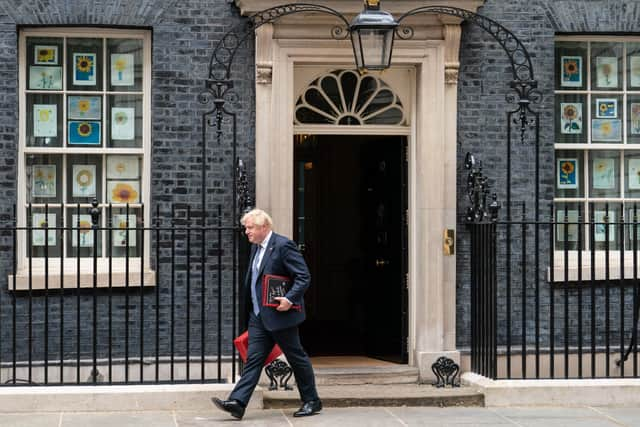Cash unlikely to solve issues at heart of the crisis
and live on Freeview channel 276
Having got used to a government and prime minister that have turned economy with the truth into an art form, people are too wise to be taken in by this apparent generosity. It is a diversionary, if costly, exercise and certainly not one that will solve the issues at the heart of the crisis we are in for the foreseeable future.
Whether splasing lots of taxpayer’s cash can save Boris Johnson’s political skin only time will tell. He has a lot of bridges yet to cross before he can assume he has got away with breaking the rules he set for everyone else. Those who saw weddings cancelled, funerals turned into lonely, bleak affairs or who were not allowed to visit dying relatives will rightly never forgive him for the antics he presided over in Downing Street.
Advertisement
Advertisement
However as far as the cost of living crisis is concerned whether or not Johnson survives will have no impact. He is not a politician who will ever admit he is in the wrong. Nothing will change until he admits the need to change the government’s approach to the two issues driving it – food and fuel. More of the same and the pursuit of unrealistic green dreams can only make matters worse.


On energy the government needs to admit its rush away from fossil fuels is misguided, because of how the world has changed over recent months. Food is a simpler issue, in that all the government needs to do is recognise that food security should be a key policy, because of changing times. It needs to stop viewing farming and food production as industries of the past and instead follow the EU lead of recognising that food security must be at the centre of policy.
Brussels too has green plans, but it has confirmed that the role of the CAP is to deliver food security, with green outcomes a by-product of that process. Strip away the politics and government ministers needs to answer a simple question raised by farmers on social media. Now that the world food supply is in chaos, do you want us to grow weeds or food?
Put that question to a majority of the electorate and the answer will be food. Ask it of politicians and the celebrities and armchair eco-warriors ministers seem in awe of and they will still cling to their now flawed green vision. This is because they enjoy the luxury of prosperity and are not going around the supermarket wondering how they can afford to feed their families. What is needed from politicians is that rare commodity for them – honesty about the scale of the challenge and the need for a reset in how we view food and those that produce it. They also need to admit science is a key part of the equation to make agriculture more productive and greener at the same time.
Advertisement
Advertisement
A government adviser said this week that gene editing could be the best way to boost national and global food security. Gideon Henderson, the professor who said this at a House of Lords committee, is right to see the potential positive impact of science. This is an area where the UK could finally steal a march on the more cautious EU, where the precautionary principle has become an anti-science approach. To be fair, Brussels is also pushing the difference between genetic modification and gene editing, the latter involving only the manipulation of existing genes rather than introducing outside genes. However convincing 27 member states to see this is a bigger challenge than the UK faces to make this science mainstream.
Gene editing is the right direction for farming and it is at long last an area in agriculture where there could be a Brexit dividend. However it is a long and expensive process from lab bench to commercial production. Outside the EU, scale may force the UK to find some new commercial partners to share costs. That may mean looking across the Atlantic and that in turn could create a clash with a country that sees little point in differentiating gene editing from genetic modification. Those are all issues for the future, but without a radical and speedy change in the government’s view of farming gene editing will be pointless as it depends on there being a productive farming industry ready to embrace the new science. As of now the government is doing all it can to snuff out that productivity.